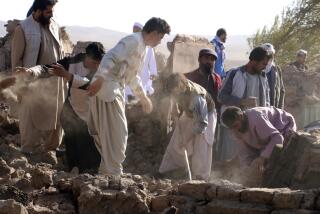Long-Haul Aid for Afghans
- Share via
The Pentagon’s shift from bombing Afghanistan to rebuilding it recognizes that although much has been done to provide emergency food and shelter for Afghans, longer-lasting remedies are needed. Doubling to more than 300 the number of civil affairs troops dispatched to bases around the country would allow for the building of more roads, bridges and schools.
Afghan President Hamid Karzai has pleaded for months for troops from the 19-nation International Security Assistance Force to be stationed in cities other than Kabul. Broadening the presence of the force would protect villagers, let relief agencies work without fear of attack and counteract warlords who continue to resist the central government’s control.
Karzai also is trying to get nations that promised billions of dollars to come up with the money to help reconstruct the country. Expanding the international force, which does not include U.S. personnel, would provide protection for U.S. Agency for International Development teams to undertake large-scale projects such as building power plants and clearing waterways, supplementing the work of military engineers carrying out smaller projects.
While waiting for expansion of the international force, the U.S. military civil affairs teams are doing most of the important rebuilding. Providing more teams to cover a wider area is important. The chairman of the Joint Chiefs of Staff, Gen. Richard B. Myers, said last week that troops continued to hunt for Al Qaeda and Taliban members, especially in areas bordering Pakistan, but the next phase of military operations in Afghanistan would be “primarily the reconstruction piece.” Helping with the rebuilding will show Afghans that foreign nations are willing to do more than provide emergency food aid and care for refugees, important though those are. Building hospitals and universities and training staff to operate the institutions are key steps in preventing the country from falling apart again.
An important part of reconstruction will be funneling foreign aid through the Kabul government and letting it do the hiring of contractors and nongovernmental organizations to dig wells, repave streets, repair power plants. A lack of electricity and water played a part in this week’s protests at Kabul University in which at least one student was killed. Donors attempting to bypass Karzai and his Cabinet might undercut the government and give more power to the warlords, whose grip must be broken if the nation is not to descend into chaos again.
Karzai this month fired more than a dozen top civil and military chiefs across the country, charging them with corruption and abuse of power. He will need help in facing down down warlords and making the firings stick. Showing Afghans that foreign countries will not cut and run this time as they did after the Soviets were expelled would increase Karzai’s chances of success. Providing more security across the country would underline the message of commitment.
More to Read
Sign up for Essential California
The most important California stories and recommendations in your inbox every morning.
You may occasionally receive promotional content from the Los Angeles Times.













